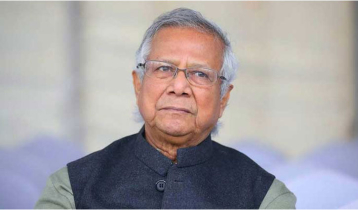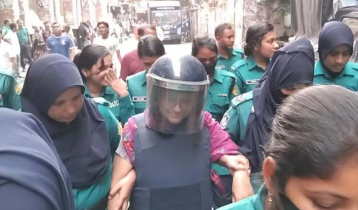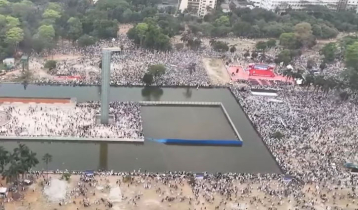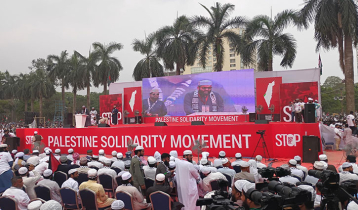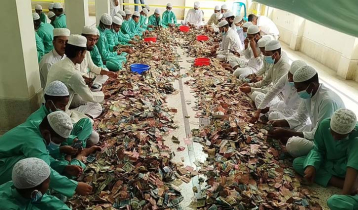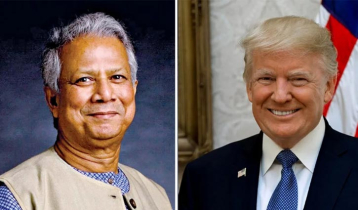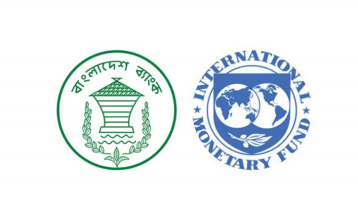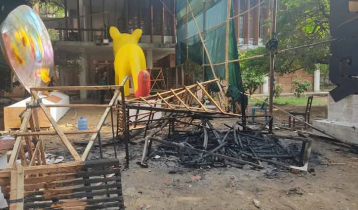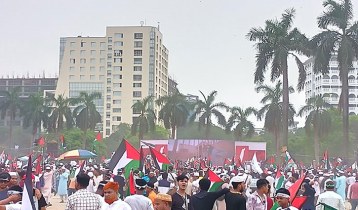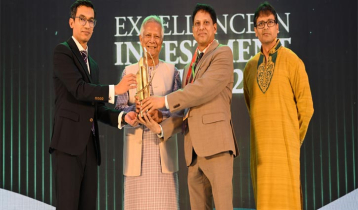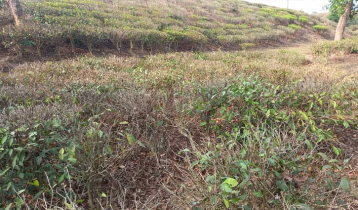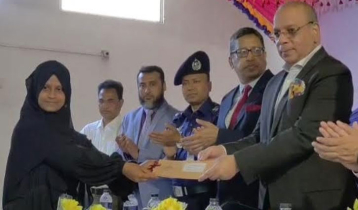BIMSTEC adopts Kathmandu Declaration as summit concludes
2 || risingbd.com
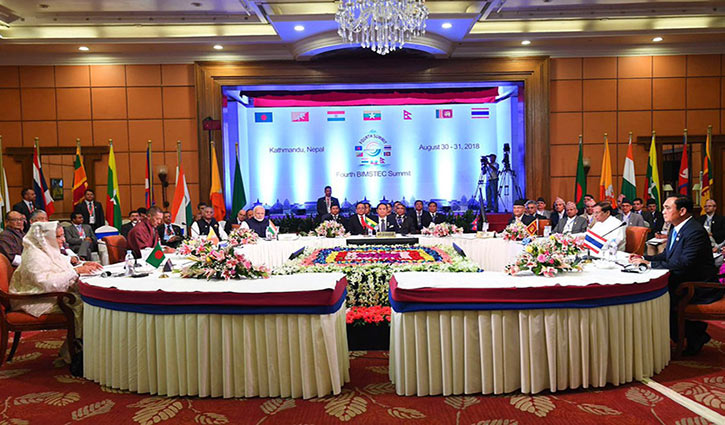
Desk Report: A multilateral meet between the leaders of seven member states of the Bay of Bengal Initiative for Multi-Sectoral Technical and Economic Cooperation (BIMSTEC) concluded on Friday.
The two-day summit wrapped up in Nepal’s Kathmandu with a slew of decisions as the countries adopted the Kathmandu Declaration which included the setting up of a development fund, establishing seamless multimodal connectivity and calling for a comprehensive approach to prevent financing of terrorists and terrorist actions and counter radicalisation.
With the end of the Summit, Sri Lanka will officially take the responsibility of the Chair of BIMSTEC.
Prime Minister of Nepal KP Sharma Oli handed over the chairmanship of the BIMSTEC to Sri Lankan President Maitripala Sirisena. Nepal had hosted the 4th edition of the summit as the chair of the seven-nation regional grouping, reports The Kathmandu Post.
The heads of state and the government and representatives of the seven-nation regional grouping were present in today’s meeting that was held at the Soaltee Hotel in Kathmandu.
Prime Minister of Bangladesh Sheikh Hasina, Prime Minister of India Narendra Modi, President of Myanmar Win Myint, President of Sri Lanka Maitripala Sirisena, Chief Advisor to the Interim Government of Bhutan Gyalpo Tshering Wangchuk and Prime Minister of Thailand Prayut Chan-o-cha-led delegates are present in the meet.
The Kathmandu Declaration “Towards a Peaceful, Prosperous and Sustainable Bay of Bengal Region” directed the relevant ministries/national agencies of the BIMSTEC countries’ governments to explore the possibility of establishing a BIMSTEC Development Fund (BDF), reports our New Delhi correspondent.
The fund will be set up at an appropriate time, with voluntary contributions from the member-countries, which will be utilised for research and planning of BIMSTEC and financing of projects, programmes and other activities of BIMSTEC centres and entities as agreed.
The leaders reiterated in the Declaration their resolve to establish seamless multi-modal transportation linkages and smooth, synchronised and simplified transit facilities through the development, expansion and modernisation of highways, railways, waterways, sea routes and airways in the region.
The Declaration also decided to speed up the countries’ efforts to conclude the BIMSTEC Coastal Shipping Agreement and the BIMSTEC Motor Vehicle Agreement as early as possible.
In this context, it called for early adoption a BIMSTEC Master Plan for connectivity.
Reaffirming the commitment to an early conclusion of BIMSTEC Free Trade Area (FTA) negotiations, the Summit asked the BIMSTEC Trade and Economic Ministerial Meeting and its subsidiary bodies including the Trade Negotiating Committee (TNC) to expedite finalisation of all related agreements of the BIMSTEC FTA as early as possible.
However, the Declaration did not include any action plan to solve the ongoing Rohingya crisis, while the persecuted Muslim minorities in Myanmar keep coming to Bangladesh seeking shelter.
The Summit expressed satisfaction on the progress of negotiation on the Agreement on Trade in Goods and the Agreement on Customs Cooperation and directed the concerned ministries/agencies of BIMSTEC countries to participate regularly in TNC meetings.
It agreed to revitalise the activities of BIMSTEC Business Forum and BIMSTEC Economic Forum to further strengthen cooperation between government and private sector for promotion of trade and investment, and task the expert group on BIMSTEC visa matters to continue negotiation for finalisation of the modalities for the BIMSTEC Visa Facilitation.
The Summit condemned terror attacks in all parts of the world including in BIMSTEC countries and terrorism in all its forms and manifestations wherever and by whoever committed and stressed that there can be no justification whatsoever for any act of terrorism.
“The fight against terrorism should target not only terrorists, terror organisations and networks but also identify and hold accountable States and non-State entities that encourage, support or finance terrorism, provide sanctuaries to terrorists and terror groups and falsely extol their virtues,” the Declaration said.
It called for a comprehensive approach of BIMSTEC countries in this regard which should include preventing financing of terrorists and terrorist actions from territories under their control, blocking recruitment and cross-border movement of terrorists, countering radicalisation, countering misuse of internet for purposes of terrorism and dismantling terrorist safe havens.
The Summit looked forward to the signing of the BIMSTEC Convention on Mutual Legal Assistance in Criminal Matters and called upon the member- states for its early ratification.
Expressing satisfaction that many member-countries have ratified the BIMSTEC Convention on Cooperation in Combating International Terrorism, Transnational Organised Crime and Illicit Drug Trafficking, the Declaration asked the remaining countries to do so.
The Summit decided to hold a meeting of home ministers of the BIMSTEC countries as part of promoting cooperation and coordination on counter terrorism and transnational crimes.
Considering that the BIMSTEC countries are prone to cyclones, earthquakes and floods, the Summit decided to establish an inter-governmental expert group to develop a plan of action to improve preparedness and coordination for responding to natural disasters in the Bay of Bengal Region.
It underscored the need for making concrete efforts to ensure the conservation of mountain ecosystems, including their bio-diversity in order to support sustainable development, and welcomed the concept note on promoting mountain economies in BIMSTEC countries developed by Nepal to promote cooperation in this area. The Summit also decided to establish an inter-governmental expert group to develop an action plan.
Emphasising the importance of blue economy, the Summit agreed to establish an inter-governmental expert group to develop an action plan in this area keeping in mind the special needs and circumstances of the landlocked member-countries.
The Summit also decided to task the BIMSTEC Secretariat to prepare a preliminary draft of the Charter for the organisation, building on the 1997 Bangkok Declaration, and defining a long-term vision and priorities for cooperation, clearly delineating roles and responsibilities of different layers of institutional structure and decision-making processes, for consideration by the BIMSTEC Permanent Working Committee (BPWC) and other higher bodies with a view to adopting it by the next summit.
It also decided to establish a BIMSTEC Permanent Working Committee to deal with administrative and financial matters of the Secretariat and the BIMSTEC centres and entities as well as to prepare schedule of meetings, prioritise and rationalise the organisation’s activities.
Source: Agencies
risingbd/Dhaka/August 31, 2018/A K Azad
risingbd.com



